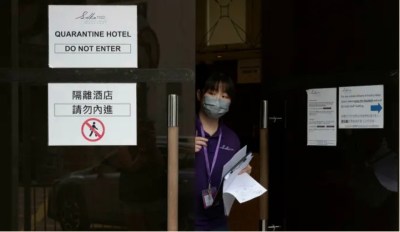Hong Kong’s government is expected to announce this week a further relaxation of its Covid-19 quarantine rules by November to attract more international travelers and restore the city’s sagging standing as an international business hub, according to local press reports.
All incoming travelers to Hong Kong must now stay at designated hotels at their own expense for three days and at home for four more days to prevent the spread of the disease. Health experts have said such a “3+4” practice could be soon changed to “0+7.”
David Hui, a government advisor on Covid-19, has said it was more likely that the existing quarantine requirements would be changed to “0+7,” instead of “0+3,” which refers to three days of home quarantine.
Travelers who test negative are currently allowed to leave their homes during the quarantine period, though under specific rules and restrictions.
Chief Executive John Lee said Tuesday that quarantine rules should only be changed in an orderly manner as Hong Kong should continue to try its best to lower the risk of virus outbreaks. On Tuesday (September 20), Hong Kong reported 5,595 Covid cases with seven deaths. Two weeks ago, the city recorded more than 10,000 new cases per day.
Political commentators have previously said that Hong Kong’s quarantine rules would not be completely removed before the Chinese Communist Party (CCP) holds its 20th National Congress on October 16.
Huang Liuquan, the deputy head of the State Council’s Hong Kong and Macao Affairs Office, said Tuesday that Hong Kong’s government would not be criticized for changing its anti-epidemic rules to fulfill economic and social development needs.
Huang’s comment was made after some Hong Kong tycoons and business leaders expressed their concerns that Hong Kong risks lagging behind Singapore, which canceled its quarantine requirements for incoming travelers in April, in terms of economic growth.

Singapore is seen as a rival Asian trade and financial hub that is increasingly poaching business from Hong Kong. When Hong Kong reported about 1,000 Covid cases per day in mid-February, Chinese President Xi Jinping ordered the Hong Kong government to make epidemic control the city’s top priority.
The government, which had planned to shift to the West’s “living with the virus” strategy, abruptly shifted course to follow Beijing’s strict “Zero Covid” policy. However, the change was not supported with sufficient medical and hospital resources.
The following month, more than one million people were infected while 10,000 Covid patients, mostly unvaccinated elderly people, died. Beijing then provided more autonomy for the Hong Kong government to fight the Covid battle but still required it not to adopt a “live with the virus” strategy.
Since April 1, Singapore has canceled its seven-day quarantine requirements for vaccinated travelers. From August 28, unvaccinated travelers can enter Singapore without quarantine. Most global countries ended their quarantine and social distancing rules in the first half of this year.
The World Health Organization (WHO) said last week that the end of the pandemic was “in sight.” On Monday, United States President Joe Biden said the Covid pandemic was over.
Hong Kong billionaire Peter Woo said in an article on September 8 that Xi had urged the special administrative region government to use its advantages to maintain its status as an international financial, logistics and trade hub. Woo said if people could not travel to Hong Kong freely, the city would no longer be seen as “Asia’s World City.”
Henry Tang, former Chief Secretary and currently a standing committee member of the Chinese People’s Political Consultative Conference (CPPCC), said on the same day that the Hong Kong government should talk to Beijing about whether Hong Kong could resume quarantine-free travel earlier than mainland China.
Tang said mainland China had a huge population to support its inward-looking “internal circulation” economic strategy but Hong Kong, with only seven million people, had to rely on cross-border economic activities to survive. He said if Hong Kong adopted the “internal circulation” model, it would end up suffering from “internal hemorrhage.”

On August 12, Hong Kong reduced the isolation period for incoming travelers from seven to three days. A total of 479,000 people arrived or departed from Hong Kong’s airport in August, up 116% from a year earlier. However, the number was only about 8% of the average of six million international travelers coming in and out of the city each month in 2019.
Last Friday, the organizers of the Hong Kong Marathon, sponsored by Standard Chartered Bank, announced it would cancel the event, originally set on November 20, because the government failed to give a clear answer about its future quarantine requirements.
The Hong Kong government later called on the organizers to reconsider holding the event in February 2023. On Tuesday, the organizers agreed to the government’s suggestion. Meanwhile, Singapore will hold its annual marathon on December 4.
It is getting more urgent for Hong Kong to resume quarantine-free international travel as the city’s property prices have shown a weakening trend this year, said some commentators.
The Centa-City Leading Index, compiled by the Centaline Property Agency, fell 2.8% to 179 points in the first half of this year.
In the second quarter, 138 out of 150 cities worldwide reported a year-on-year increase in residential property prices while Hong Kong was among the 12 global cities that recorded a decline, according to Knight Frank.
Martin Wong, director and head of research and consultancy for Greater China at Knight Frank, said Hong Kong’s home prices dropped 2.4% while Singapore’s rose 10.6% in the second quarter year on year.
Wong said Hong Kong’s property markets would remain sluggish in the remaining months of this year unless the city resumed quarantine-free travel.
Read: China locks down 34 cities for a smidgen of Covid cases
Follow Jeff Pao on Twitter at @jeffpao3

